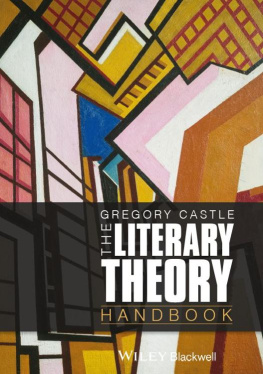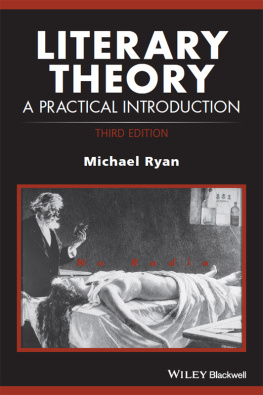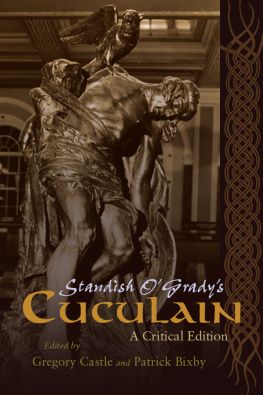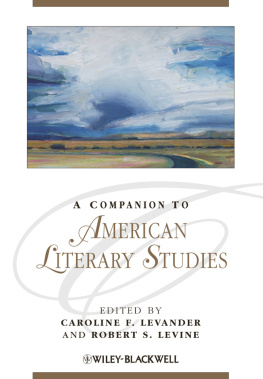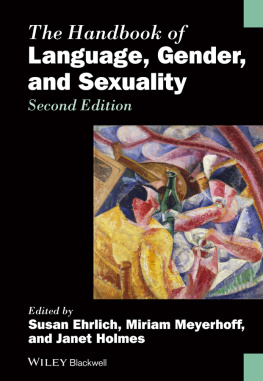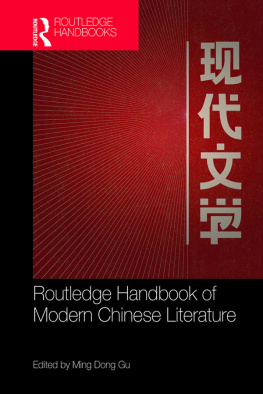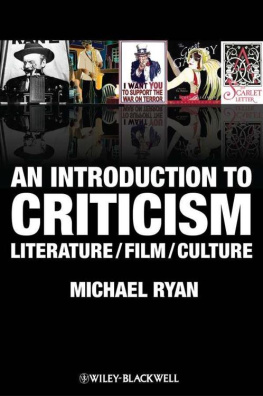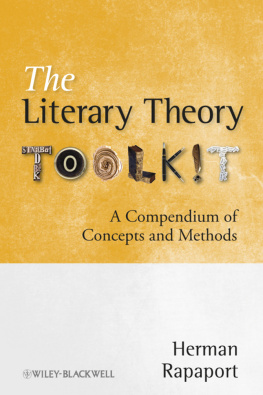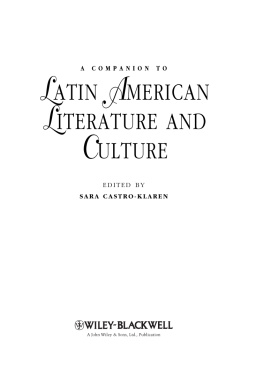Gregory Castle - The Literary Theory Handbook (Wiley Blackwell Literature Handbooks)
Here you can read online Gregory Castle - The Literary Theory Handbook (Wiley Blackwell Literature Handbooks) full text of the book (entire story) in english for free. Download pdf and epub, get meaning, cover and reviews about this ebook. year: 2013, publisher: Wiley, genre: Romance novel. Description of the work, (preface) as well as reviews are available. Best literature library LitArk.com created for fans of good reading and offers a wide selection of genres:
Romance novel
Science fiction
Adventure
Detective
Science
History
Home and family
Prose
Art
Politics
Computer
Non-fiction
Religion
Business
Children
Humor
Choose a favorite category and find really read worthwhile books. Enjoy immersion in the world of imagination, feel the emotions of the characters or learn something new for yourself, make an fascinating discovery.
- Book:The Literary Theory Handbook (Wiley Blackwell Literature Handbooks)
- Author:
- Publisher:Wiley
- Genre:
- Year:2013
- Rating:3 / 5
- Favourites:Add to favourites
- Your mark:
- 60
- 1
- 2
- 3
- 4
- 5
The Literary Theory Handbook (Wiley Blackwell Literature Handbooks): summary, description and annotation
We offer to read an annotation, description, summary or preface (depends on what the author of the book "The Literary Theory Handbook (Wiley Blackwell Literature Handbooks)" wrote himself). If you haven't found the necessary information about the book — write in the comments, we will try to find it.
Gregory Castle: author's other books
Who wrote The Literary Theory Handbook (Wiley Blackwell Literature Handbooks)? Find out the surname, the name of the author of the book and a list of all author's works by series.
The Literary Theory Handbook (Wiley Blackwell Literature Handbooks) — read online for free the complete book (whole text) full work
Below is the text of the book, divided by pages. System saving the place of the last page read, allows you to conveniently read the book "The Literary Theory Handbook (Wiley Blackwell Literature Handbooks)" online for free, without having to search again every time where you left off. Put a bookmark, and you can go to the page where you finished reading at any time.
Font size:
Interval:
Bookmark:
Contents
This new series offers the student thorough and lively introductions to literary periods, movements, and, in some instances, authors and genres, from Anglo-Saxon to the Postmodern. Each volume is written by a leading specialist to be invitingly accessible and informative. Chapters are devoted to the coverage of cultural context, the provision of brief but detailed biographical essays on the authors concerned, critical coverage of key works, and surveys of themes and topics, together with bibliographies of selected further reading. Students new to a period of study or to a period genre will discover all they need to know to orientate and ground themselves in their studies, in volumes that are as stimulating to read as they are convenient to use.
The Science Fiction Handbook
M. Keith Booker and Anne-Marie Thomas
The Seventeenth-Century Literature Handbook
Marshall Grossman
The Twentieth-Century American Fiction Handbook
Christopher MacGowan
The British and Irish Short Story Handbook
David Malcolm
The Crime Fiction Handbook
Peter Messent
The Literary Theory Handbook
Gregory Castle

This edition first published 2013
2013 John Wiley & Sons, Ltd
Wiley-Blackwell is an imprint of John Wiley & Sons, formed by the merger of Wileys global Scientific, Technical and Medical business with Blackwell Publishing.
Registered Office
John Wiley & Sons, Ltd, The Atrium, Southern Gate, Chichester,
West Sussex, PO19 8SQ, UK
Editorial Offices
350 Main Street, Malden, MA 02148-5020, USA
9600 Garsington Road, Oxford, OX4 2DQ, UK
The Atrium, Southern Gate, Chichester, West Sussex, PO19 8SQ, UK
For details of our global editorial offices, for customer services, and for information about how to apply for permission to reuse the copyright material in this book please see our website at www.wiley.com/wiley-blackwell .
The right of Gregory Castle to be identified as the author of this work has been asserted in accordance with the UK Copyright, Designs and Patents Act 1988.
All rights reserved. No part of this publication may be reproduced, stored in a retrieval system, or transmitted, in any form or by any means, electronic, mechanical, photocopying, recording or otherwise, except as permitted by the UK Copyright, Designs and Patents Act 1988, without the prior permission of the publisher.
Wiley also publishes its books in a variety of electronic formats. Some content that appears in print may not be available in electronic books.
Designations used by companies to distinguish their products are often claimed as trademarks. All brand names and product names used in this book are trade names, service marks, trademarks or registered trademarks of their respective owners. The publisher is not associated with any product or vendor mentioned in this book. This publication is designed to provide accurate and authoritative information in regard to the subject matter covered. It is sold on the understanding that the publisher is not engaged in rendering professional services. If professional advice or other expert assistance is required, the services of a competent professional should be sought.
Library of Congress Cataloging-in-Publication Data
Castle, Gregory.
The literary theory handbook / Gregory Castle.
pages cm. (Blackwell Literature Handbooks)
Includes bibliographical references and index.
ISBN 978-0-470-67195-5 (Pbk. : alk. paper) ISBN 978-1-118-33158-3 (ePub)
ISBN 978-1-118-33161-3 ISBN 978-1-118-33195-8 (eMobi) ISBN 978-1-118-33247-4 (ePdf) ISBN 978-1-118-33201-6 (cloth soft) 1. CriticismHistoryHandbooks, manuals, etc. 2. LiteratureHistory and criticismTheory, etc.Handbooks, manuals, etc. I. Title.
PN86.C35 2013
801.9509dc23
2012050374
A catalogue record for this book is available from the British Library.
Cover image: Wyndham Lewis, Workshop, c.191415, oil on canvas, 765 610 mm. Tate, London.
Tate, London 2013.
Cover design: Richard Boxall Design Associates.
For Ralph and Donna Castle,
whose encouragement and support come without condition
and
Camille Angeles-Castle,
who continues to teach me the theory of love
The Literary Theory Handbook was first published in 2007 under the title The Guide to Literary Theory. Since publishing the first edition, I have taught a number of literary theory courses and participated on panels and roundtables at international conferences; I also talked with many friends and colleagues about various issues and problems in literary theory. Over those six years, a number of theories and theorists were becoming more prominent and it seemed to me that the time was ripe for another edition, one that would not only include these new directions and new thinkers but also expand and refine the existing material. To all the people involved in these various conversations I owe more than I can say. I am grateful for the opportunity to teach literary theory and thereby discover at first hand what sort of things readers at all levels might require. I thank especially the graduate students at ASU who were instrumental in advancing my own understanding of the myriad theories discussed in this Handbook. I want to single out for special thanks Ian Murphy, who served as a research assistant in the final phase of this project, and Kristi Van Stechelman Perkins, a former student and dear friend who has talked with me for hours over the years about theory and literature and life and to her I owe a debt of affection and gratitude. I want also to thank my colleagues in the Department of English, particularly Patrick Bixby, Ron Broglio, Joni Adamson, Mark Lussier, Claudia Sadowski-Smith, and Dan Bivona, for bearing with me when I asked them about their own approach to theory or engaged them in discussions of particular theoretical problems.
I want to thank Professor Gerardine Meaney, director of the Humanities Institute at University College, Dublin, for providing me with office space and library access so that I might work on this book. And to Ruth Black, I give thanks for being such a good host and providing me with a comfortable environment in which to work. Ruby, the boxer, whose contemplative mood rivaled that of any philosopher I have read, kept me company on many rainy afternoons. Finally, I am deeply grateful for the patience and kind attentions of Alyssha Nelson, who watched over the final stages of this book.
I would like to thank the following friends and colleagues for their advice and counsel: Joseph Valente, David Lloyd, James Phelan, Stephen Ross, Margot Backus, Nicholas Allen, Enda Duffy, and Gregory Dobbins. My dear friend Chouki El Hamel, a brilliant historian and critical thinker, bore with me for many hours as I hashed out various theoretical problems and offered sound advice and often led me to new insights. Another dear friend and mentor, John Paul Riquelme, has been a sounding board and guide for more years than I can remember (or will confess to) and has helped me understand the suppleness and nuances of theoretical approaches to literature. But more than that, he and his partner, Marie-Anne Verougstraete, have opened up their home to me on more than one occasion and it was in the third floor aerie of their home in Boston that I was able to finish this book on time. Finally, I want to thank Michael Ryan, with whom I worked on the Blackwell Encyclopedia of Literary and Cultural Theory. Over four years of working together, I received what amounted to a master-class in theory. Without his sound judgment and often impassioned advocacy for this or that idea, this
Next pageFont size:
Interval:
Bookmark:
Similar books «The Literary Theory Handbook (Wiley Blackwell Literature Handbooks)»
Look at similar books to The Literary Theory Handbook (Wiley Blackwell Literature Handbooks). We have selected literature similar in name and meaning in the hope of providing readers with more options to find new, interesting, not yet read works.
Discussion, reviews of the book The Literary Theory Handbook (Wiley Blackwell Literature Handbooks) and just readers' own opinions. Leave your comments, write what you think about the work, its meaning or the main characters. Specify what exactly you liked and what you didn't like, and why you think so.

